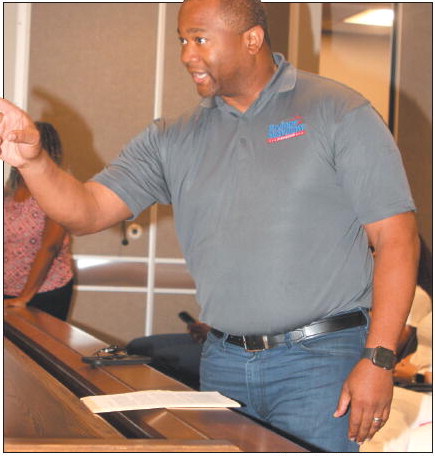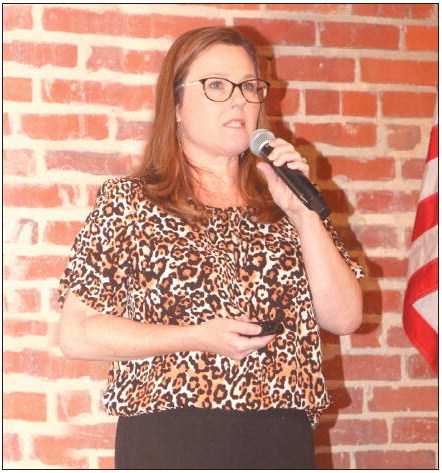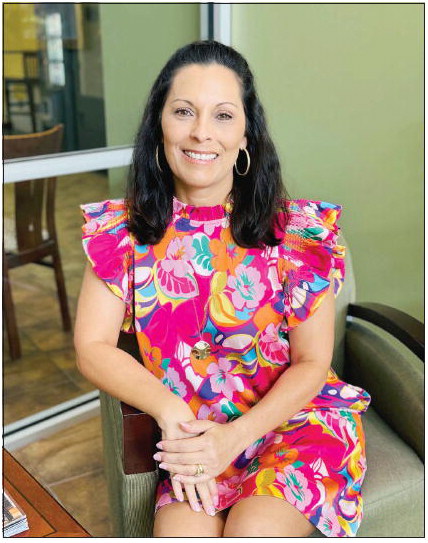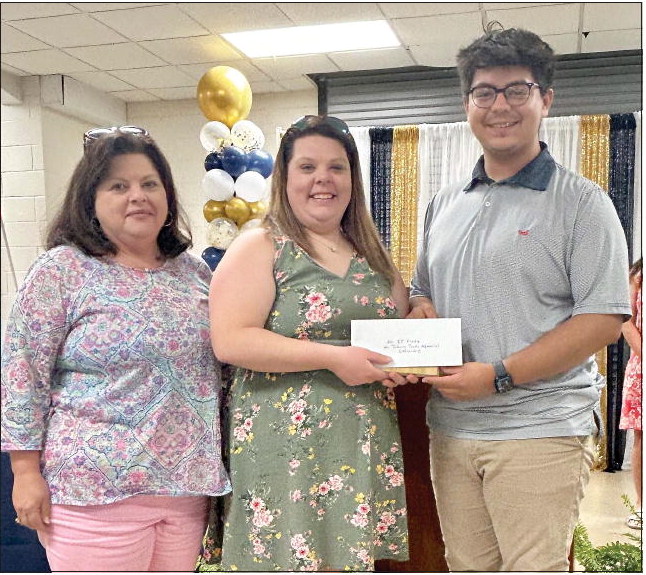Top Issues: Budget, Pandemic Relief, Election Reform


Chamber’ Holds Virtual Pre- Legislative Forum
The state budget, election integrity and COVID-19 relief were among the top issues in a prelegislative forum sponsored last Thursday by the Toombs-Montgomery County Chamber of Commerce.
The forum, originally planned as a luncheon, was held online because of precautions against the health pandemic. State Sen. Blake Tillery, R-19, and State Representative Greg Morris, R-156, both of Vidalia, made statements and fielded questions from an audience joining the forum online. The forum was moderated by John Koon, continued from page
Communications Director for the Vidalia City Schools.
Senator Tillery outlined the top concerns he expects to dominate the 2021 legislative session which began Monday. “There are three major issues this session: the budget; COVID 19 relief; and election integrity.”
Tillery, who assumed the duties of chair of the Senate Appropriations Committee following the death of Senator Jack Hill in mid-term last year, observed in an interview following the forum, “Going into 2020, state revenues were not all that strong, but the national economy looked good. Now, we are in this weird spot where exactly the opposite is happening. The national economy doesn’t necessarily look that strong but the state’s numbers look strong because of all the federal dollars that have been infused into the economy.”
The Senator explained that one out of every four dollars in the state economy is federally infused “whether that be through PPP (federal Payroll Protection Program) payments, enhanced unemployment benefit payments, or any other federal means through extra payments to schools, doctors and hospitals.”
In order to balance the state’s $26 billion budget in 2020, legislators asked state agencies to trim their budgets, but Tillery does not anticipate having to repeat that action in 2021. “I think we reduced the budget enough last year that we won’t have to do that. That was the goal. But I do not think we will be in a position to add everything back that we had to take away. I imagine the budget will be pretty close to flat.”
Tillery said additions to the budget will likely be in three areas: adding funds to education; accommodating and facilitating public health needs; and broadband expansion in the state. “Those three areas have the best chance of seeing money put back when the economy is stronger.” He pointed out that there are other concerns outside these three priorities. “We still have people in our district who are having trouble with unemployment payments that they have been requesting since summer. I imagine you will see some legislation to address that.”
Tillery said of COVID- 19 relief, “It is everything from making sure we are putting businesses in a position where they can stay open and are not forced by the federal government to close, that there is access to capital to keep small businesses open, that they have PPE (personal protective equipment) and vaccine distribution as well for those who want it.”
With the controversy of the recent Presidential and Senate runoff elections fresh in everyone’s minds, Tillery said about election integrity. “That is the thing my office has heard more about than any other issue ever. The people of Georgia deserve to know that those who were supposed to vote were able to do so and that those who were not supposed to vote didn’t. We have got to make sure as we continue to go through this when we find any loopholes, whether they were exploited or not, that these loopholes are closed.”
Representative Morris agreed that the top priorities for the 2021 term of the state Legislature will be election reform; adopting a “balanced, conservative and financially prudent budget,” and “doing what we need to do to protect our citizens from COVID and doing what we need to do to protect our businesses from unwanted intrusion, in terms of shutdowns and lockdowns.”
He stressed, “Shutting down the economy is not an effective way to slow or get rid of COVID.” The answer is the long-term availability of a vaccine, he noted.
Morris emphasized, “We are going to fight intrusion on capitalism and free enterprise in the state of Georgia. We are going to try to protect Georgia businesses and working men and women. If we look after those folks, everything else will take care of itself.”
Noting he has been getting upward of 2,000 emails a day during the election process, he said to his constituents, “It is always good to hear from you, even if the news is bad and even if you are angry. We are angry, too, about some things. It is your right to question us about the actions we take or don’t take. Thank you for your input.”
Morris said the upcoming legislative session will look very different because of COVID, “just legislators socially spread out, no lobbyists or visitors. We will be tested for COVID twice a week.”
Morris said the state and the nation took a hit when COVID-19 arrived, but the state economy is sound. He alluded to the state’s Triple A bond rating and Georgia being named in 2020 as “The Top State for Doing Business” for the seventh year in a row. In 2020, the Port of Savannah was named the top port for the U.S. in exports from January through May, and Georgia had a total of more than $7.4 billion in new business investments made in the state during FY 2020.
“We have made more activity in the last five years in building state infrastructures than in the last 15 years,” Morris added.
Senator Tillery pointed out that agriculture is still the number one business in Georgia, the port in Savannah is the most efficient port in the United States, and the state has the natural resources the rest of the world needs. “On the local front, we saw real estate sales triple in 2020. Whether it was low interest rates or people wanting to leave densely-packed areas, we have seen land and home purchases soar.” He said the only pull-back is sporadic broadband services. “And I would be remiss not to mention that in some areas I represent, citizens don’t even have good cell phone service.”
Tillery said of broadband expansion, “We’re working on that.” In addition to the negotiations going on between private companies and Georgia EMCs to add broadband lines to existing poles, a project being negotiated by the state Public Service Commission, the state is attempting to leverage retiring military technologists from the military’s Fort Gordon cyber communications center to join the state cyber communications facility and to expand this technology statewide.
Regarding the issue of broadband expansion, Morris said, “Having broadband is critical, not only to business growth, but to educational opportunities in rural Georgia.”
Both legislators praised the area school systems’ innovation and ingenuity in keeping the educational process going while maintaining safety during the pandemic, but expressed concern about the long-term effects of prolonged virtual learning. “We have some systems in our state meeting twice a week virtually and that’s it. Those students will be a year or a year and a half behind by the time we are done with this pandemic. It is not fair to students and not good for our state,” Tillery said.
What the state will be able to accomplish in educational funding, though a priority, remains to be determined. But Tillery was optimistic about future federal funding for Georgia schools. “The federal government outweighs what the state can do. Our entire state budget is $26 billion and we had to cut $950 million from our Quality Basic Education formula to balance the budget. The last bill we saw come out of Congress includes $7 billion coming to Georgia and K-12 schools, twice what we had to reduce by. We are a much smaller player in the funding formula.”
Responding to a question about tax credits for movie companies filming primarily in the metro Atlanta area and how that benefits other areas of the state, Tillery commented, “To be fair to both sides, these revenues not only benefited Atlanta.” He noted the revenue goes into state coffers to trickle down to the entire state. He added, “But I have issues with tax credits generally, particularly when they are not time specific. Tax credits deserve extreme scrutiny.”
Representative Morris offered, “Every penny we get in tax credits comes back to us. It (the movie industry) is another opportunity to put Georgians of the next generation in an evolving business.”
On the issue of health insurance, Morris said he thinks the state was right not to opt into the Medicaid expansion. “I think we were right. I still don’t believe it’s the answer. We anticipate a push to try to get us to move in the direction of Medicaid expansion. No matter what the federal government promises in supporting us, they failed on what they have done so far. We would be looking at an $8 to $10 billion investment,” he said.
Steven McComas, incoming chairman of the board for the Chamber, welcomed the audience for the online forum. “Our Chamber of Commerce was pleased to offer this opportunity to hear directly from our area legislators addressing critical business issues facing our members. From tax policies to business regulations to financial support for public sector capital improvements to programs supporting business growth to educational initiatives that impact workforce development, our political representatives make a difference that will impact our members in 2021.” McComas noted three takeaways from the presentation that he would like to see the legislators target. “First, we need to ensure the State of Georgia Tax Code allows business expense deduction of payroll and other allowed expenses supporting the Federal Payroll Protection Forgiveness Program for our members. Next, I would like to see if they could help reduce our members’ increasing health insurance premiums. Finally, I am encouraged to learn that our representatives are focused on getting high-quality broadband to our members for increased access required for success.” McComas added, “My prayer is that soon our darkest days will be behind us and 2021 will be a year that we see economic growth at national, state, and local levels. I share Federal Reserve Chairman Powell’s recently-released optimistic 2021 economic forecast of 4.2% annual growth up from a negative -2.4% in 2020.” He enthused, “Together we’ve got this! Our Board is focused on our members’ success in 2021, and we are all praying for peace and good health for all in 2021.”

Sen. Blake Tillery






